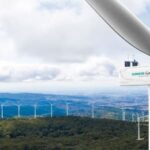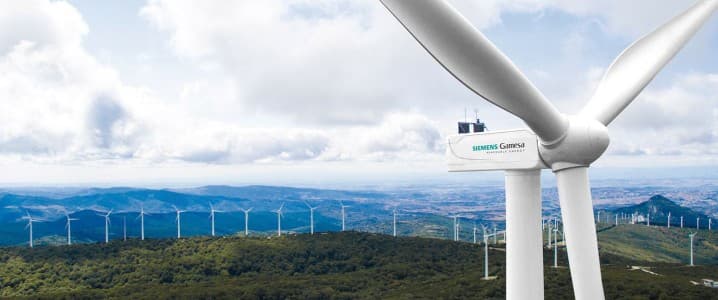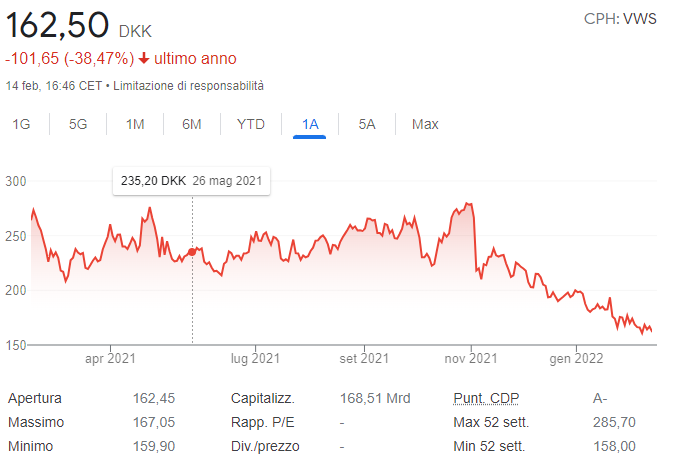Wind power: 2021 was a year of calm, and of losses. Hopefully in 2022


Both GE and Siemens had a steep drop in wind power revenues last year, but what will happen this year? With Germany and other developed renewable energy regions experiencing low wind speeds in 2021, many have questioned whether wind is the reliable form of energy that has so often been described.
Siemens Gamesa's renewable energy business has seen its market capitalization nearly halve over the past year as supply chain disruptions and low wind levels negatively impacted operations. Siemens said its revenue dropped to $ 2.06 billion between October and December 2021, marking a 20.3% year-over-year decline. Operating losses totaled nearly $ 353 million. The shares have more than halved in value

The company believes its revenue could contract between 9 and 2% year-on-year, stating: "Considering the results in the first quarter of fiscal 22 and the fact that the company does not expect a normalization of supply conditions in the rest of the year. year, Siemens Gamesa has adjusted its guidance for fiscal year 22. The chairman of the board, Miguel Angel López, explained that the company was "experiencing significant challenges in its onshore business in a very difficult market".
This is not the only European wind power major to feel the strain, as both Vestas and Orsted warned of tough times for the renewables sector late last year. Danish companies have voiced their concerns about low wind speeds, ongoing challenges in the supply chain and rising production costs associated with wind power operations. Vestas, for example, also suffered a 36% drop in share value last year.

Orsted saw a drop in profits in 2021 associated with slower wind speeds than in 2020. Europe had some of the lowest wind speeds in decades last year. This, combined with the associated higher costs, from raw materials to transportation, has meant a tough year for renewable energy companies. Despite the optimism that emerged from the COP26 climate summit last fall, these are inevitably the kind of challenges green energy companies can expect to face as they scale up operations over the next few years.
In terms of raw materials, steel prices soared in 2021, with the benchmark price up 86% in the US and 53% in Europe. As steel makes up a significant part of the wind turbine structure, the cost of new wind farm projects has skyrocketed. Uncertainties about cost and reliability of wind speed subsequently lowered the share prices of many renewable energy companies.
In the first half of 2021, Germany reported that its share of renewable energy dropped to 42.6% of the country's total power, down 8.1%. Offshore and onshore wind energy decreased by 28%. With Germany expected to pave the way for the EU's ambitions to rely entirely on renewable energy in the coming decades, decarbonising its national economy, it will need to show the world how it is recovering from this volatile year in the future.
In the United States, General Electric's (GE) renewable energy segment also faces challenges from rising raw material and transportation costs that negatively impact its onshore wind operations. Company CEO Larry Culp said, "I don't see a close solution yet." And "we will see a little more inflationary pressure in 2022," he said.
GE is battling rising costs and difficulties with the supply chain by looking for alternative suppliers and looking for alternative parts to try to manage prices. Inflation felt during and after the pandemic hit companies across all sectors hard. However, thriving sectors like renewable energy feel worse as they try to take off, encountering several obstacles along the way. For GE, doubt over the extension of U.S. production tax credits for onshore wind adds to the uncertainty in the industry.
Basically we have an industrial sector seen as relevant that is at the mercy of the wind. Even a million wind towers can be built, but without wind none of them move. The sector is partially dependent on investments and planning risks being uncertain. This is also clearly understood by the pressing publicity made by various operators for investing in green funds, such as the latest Amundi campaign. We always try to distribute the losses, and to concentrate the profits, even when this is not "Ecologically ethical".

Thanks to our Telegram channel you can stay updated on the publication of new articles of Economic Scenarios.
The article Wind: 2021 was a year of calm, and of losses. Hopefully in 2022 it comes from ScenariEconomici.it .
This is a machine translation of a post published on Scenari Economici at the URL https://scenarieconomici.it/eolico-il-2021-e-stato-un-anno-di-bonaccia-e-di-perdite-si-spera-nel-2022/ on Mon, 14 Feb 2022 16:19:15 +0000.
